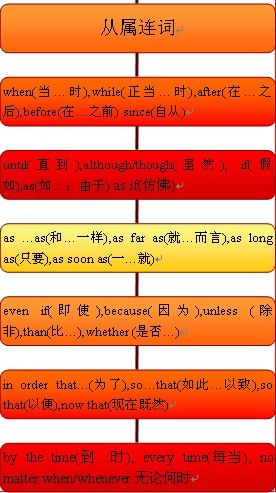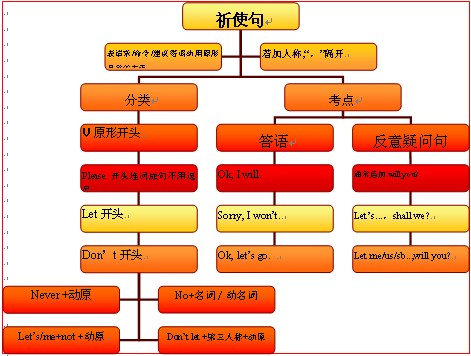本试题 “_____ lie in the sun for too long, _______ you will get sunburnt.[ ]A. Not; andB. Don't; otherwiseC. Shouldn't; forD. Let's not; and” 主要考查您对从属连词
祈使句
等考点的理解。关于这些考点您可以点击下面的选项卡查看详细档案。
- 从属连词
- 祈使句
从属连词的概念:
连词用于引导从句以形成句子的一部分或修饰句子的构成要素的叫作从属连词。
英语从属连词用法分类详解:
1、引导时间状语从句的从属连词:
(1)表示“当…时候”或“每当”的时间连词。主要的when, while, as, whenever:
如:He jumped up when the phone rang. 电话铃响时他吓了一跳。
We listened while the teacher read. 老师朗读时我们听着。
The phone rang just as I was leaving. 我正要离开,电话铃就响了起来。
(2)表示“在…之前(或之后)”的时间连词。主要的有before, after:
如:Turn the lights off before you leave. 离开前请关灯。
He started the job soon after he left the university. 他大学毕业后就开始做这份工作。
(3)表示“自从”或“直到”的时间连词。主要的有since, until, till:
如:He has lived here since he got married. 他结婚后就一直住在这儿。
Most men worked until[till] they're 65. 大多数男人工作到65岁。
(4)表示“一…就”的时间连词。主要的有as soon as, the moment, the minute, the second, the instant, immediately, directly, instantly, once, no sooner…than, hardly…when等:
如:Tell him the news as soon as you see him. 你一见到他就把这消息告诉他。
I recognized her the moment(that) I saw her. 我一看到她就认出她来了。
I want to see him the minute(that) he arrives. 他一到来我就要见他。
I went home directly I had finished work. 我一干完活就回家了。
Once he arrives, we can start. 他一来我们就可以开始。
(5)表示“上次”、“下次”、“每次”等的时间连词。主要的有every time(每次),each time(每次),(the) next time(下次),any time(随时),(the) last time(上次),the first time(第一次):
如:Last time I saw him, he looked ill. 上次我见到他的时候,他好像有病。
Next time you're in London come and visit us. 你下次来伦敦过来探望我们。
Do look me up next time you're in London. 你下次到伦敦来,一定来找我。
Every time I call on him, he is out. 我每次去访问他,他都不在。
You can call me any time you want to. 你随时都可以给我打电话。
【注】every time,each time,any time前不用冠词,(the)next time, (the)last time中的冠词可以省略,而the first time中的冠词通常不能省略。
2、引导条件状语从句的从属连词:
这类连词主要有if, unless, as[so] long as, incase等:
如:If anyone calls tell them I'm not at home. 要是有人打电话来,就说我不在家。
You will fail unless you work hard. 你若不努力就会失败。
As[So] long as you need me, I'll stay. 只要你需要我,我就留下。
In case I forget, please remind me about it. 万一我忘记,请提醒我一下。
【注】在条件状语从句中,通常要用一般现在时表示将来意义,而不能直接使用将来时态。不过,有时表示条件的if之后可能用will,但那不是将来时态,而是表示意愿或委婉的请求(will为情态动词):
如:If you will wait a moment, I'll fetch the money. 请等一下,我就去拿钱。
3、引导目的状语从句的从属连词:
主要有in order that, so that, in case, for fear等:
如:We used the computer in order that we might save time. 我们使用计算机是为了节约时间。
Speak clearly so that they may understand you. 说清楚,以便让他们能明白你的意思。
Be quiet in case you should wake the baby. 安静些,免得把婴儿吵醒。
He is working hard for fear he should fail. 他努力工作以免会失败。
4、引导结果状语从句的从属连词:
主要的有so that, so…that, such…that等:
如:We're all here now, so that the meeting can begin at last. 我们现在都到齐了,终于能开会了。
It's so difficult a question that none of us can answer it. 那是一个很难的问题,我们没有一个人能回答。
He shut the window with such force that the glass broke. 他关窗户用力很大,结果玻璃震破了。
【注】so that中的that在口语中通常可以省略。
5、引导原因状语从句的从属连词:
主要的有because, as, since, seeing(that), now(that), considering(that)等:
如:He couldn't got to school because he had a cold. 他因患感冒而未能去上学。
Since everybody is here, let's begin our discussion. 大家都到了,我们就开始吧。
Seeing that it is 8o'clock, we'll wait no longer. 由于时间已到8点,我们将不再等了。
Now that you are here, you'd better stay. 你既然来了,最好还是留下吧。
6、引导让步状语从句的从属连词:
主要有although, though, eventhough, even if, while, however, whatever, whoever, whenever, wherever等:
如:Although[Though] he is poor, he is well contented. 他虽穷却能知足常乐。
Though[Even though] it's hard work, I enjoy it. 尽管是苦活,但我乐意干。
Even if you don't like wine, try a glass of this. 即使你不喜欢喝酒,也尝尝这杯吧。
7、引导方式状语从句的从属连词:
主要有as, like, as if, as though, the way等:
如:Do it as[like] he does. 像他那样做。
He behaved as if nothing had happened. 他装作若无其事的样子。
They treat me as though I were a stranger. 他们待我如陌生人。
Nobody else loves you the way(=as) I do.没有人像我这样爱你。
8、引导地点状语从句的从属连词:
主要有where, wherever, everywhere等:
如:There were lots of parks where I lived. 我住的地方有许多公园。
Sit wherever you like. 你想坐在那儿就坐在那儿。
Everywhere they went, they were warmly welcomed. 他们每到一个地方都受到热烈欢迎。
9、引导比较状语从句的从属连词:
主要有than和as…as:
如:It's easier than I thought. 这比我想像的要容易。
They are as often wrong as they are right. 他们错对各半。
10、引导名词性从句的从属连词:
主要有that, if, whether:
如:It is clear enough what he meant. 他是什么意思很清楚。
Your greatest fault is that you are careless. 你最大的缺点是粗心大意。
Whether it will do us harm remains to be seen.是否对我们有害还要看一看。
She didn't say if he was still alive. 她没说他是否还活着。
从属连词知识体系:

用作从属连词的六类名词结构:
英语中有些名词结构可用作从属连词,用以引导状语从句,且主要是时间状语从句。这类结构归纳起来有以下六类:
一、the+瞬间名词:
其中的瞬间名词主要包括moment, minute, instant, second等,其意为“一……就……”,相当于as soon as。
如:The minute he saw her he fell in love. 他对她一见倾心。
Telephone me the moment(that) you get the results. 你一有结果,马上给我打电话。
I was so tired that I fell asleep the instant I closed my eyes. 我很累,一合上眼就睡着了。
Sheputdownthereceiverthesecondsherecognizedmyvoice.她一听出是我的声音,马上就放下电话听筒。
注:其中的瞬间名词后可接that,也可省略。另外,有的个别副词(如directly/immediately等)也可表示类似意思。
如: Immediately the meal was over,he switchedon the radio.饭一吃完他就把收音机打开。
二、the+季节名词:
其中的季节名词包括spring,summer,autumn,winter,其意为“在……的那年春天、夏天、秋天、冬天。
如:His wife left him thes pring he went abroad.在他出国的那年春天,他的妻子离开了他。
He sold his house and went to the souththe summer he lost hisjob.在他失业的那年夏天,他卖掉房子去了南方。
He was sentto prison the winter his third daughter was born.在他第三个女儿出生的那年冬天,他被关进了监狱。
She got married the autumn she graduated from college.她大学毕业的那年秋天就结婚了。
三、the+时间名词:
其中的时间名词主要包括hour,day,night,week,month,season,year等,其意为“在……的时候、那天、那个晚上、那周、那个月、那个季节、那年”。
如: The hour he wa sin her office,he felt very sad.当他在她办公室的时候,他感到很伤心。
The day here turned home,his father was already dead.他回家的那一天,他的父亲已经死了。
The night I wenttoseeher,shehadleftforBeijingtoattendanimportantmeeting.就我去看她的那个晚上,她到北京去开一个重要的会议了。
Mr Smith didn't go to work the week his wife was ill.史密斯先生在他妻子生病的那个星期没去上班。
They ear helivedinthecountry,he learned alot.他在乡下呆的那一年,他学到了不少东西。
四、the+序数词+time
其中的序数词包括first,second,third,fourth等,其意为“当第几次……的时候”。
如: My girlfriend beat me at pokert he first time weplayed.我头一次和女朋友打扑克,她就把我赢了。
These cond time I saw her,she looked like an old woman.我第二次见到她时,她看上去像一个老太婆。
The third time I went there,I found all of them had left and the offices were all empty.我第三次去那儿时,我发现他们都离开了,所有的办公室都是空的。
注:
1.next,last也具有类似序数词的性质,因此也具有以上用法。
如: Nexttimeyoucomein,pleaseclosethedoor.下次你进来,请关门。
Thelasttimewetalkedhesaidheneededanothertwodays.上次我们谈话时他说他还需要两天。
2.thefirsttime,thesecondtime,thethirdtime等用作连词引导时间状语从句时,其前通常要有定冠词,而(the)nexttime,(the)lasttime引导状语从句时,其中的冠词可以省略,如下面这道上海高考题,其答案是C,不是A:
I though ther nice and honest______Imether.
A.first time B.fo rthe first time C.the first timeD.by the first time
五、不定代词+time
其中的不定代词主要包括each,every,any等。
如:Every time I ringher,the phone is engaged.我每次给她打电话,电话都占线。
Every time I see him he either wants to tell me his trouble or borrow some money.每次我见到他,他不是向我诉苦,就是要向我借钱。
He felt nervous each times he spoke to him.每次她和他讲话,他都感到紧张。
AnytimeyoucometoLondondolookmeup.你无论什么时候到伦敦来,一定要来看我。
注意:everytime,eachtime,anytime用作连词引导状语从句时其前习惯上不用冠词,它与the first time,these cond time,the third time等引导时间状语从句时其前必须要用定冠词不同。
六、其他名词结构
以上归纳的名词结构均用于引导时间状语从句,有些其他结构还可引导其他性质的状语从句,如the way可用于引导方式状语从句,表示“像……一样”。如:
The didn’t do it the way we do now.那时他们不像我们现在这样行事。
Joyce looked at me the way alotof girls did.乔伊丝像许多姑娘那样瞧着我。
注:这样用的theway与as用法相似。
如:Hold itin both hands,the way(=as)Mummy does.用两只手捧住,像妈妈那样。
祈使句的概念:
表示请求或命令的句子是祈使句。祈使句一般用降调,为使祈使句听起来比较婉转,可用低声调,祈使句句末用句号或感叹号。祈使句有两种类型:含有第二人称和带有第一、三人称主语的祈使句。每种类型又有肯定形式和否定形式。用don't否定时,只能用其缩略形式。
例如:Welcome to Beijing Park.
祈使句的点拨:
一、祈使句的句式特征:
祈使句常常是表达说话人对对方的劝告、叮嘱、请求或命令等。因此,祈使句中一般没有主语,但根据其句意,实际上是省略了主语you。祈使句句末用感叹号或句号,朗读时,常用降调。在表达请求或劝告时,在祈使句前或句末可加上please,以使句子的语气更加缓和或客气。祈使句一般没有时态的变化,也不能与情态动词连用。
例如:Keep off the grass! 勿踩草地!
Put the boxes in the small room. 把那些盒子放到那个小房间里。
二、祈使句的肯定句式:
祈使句的肯定句式一般分为以下三种类型:
1、行为动词原形+其他成分:
例如:Make sentences after the model. 根据例句造句。
2、Be动词+其他成分(形容词、名词或介词短语等):
例如:Be careful when crossing the street. 过马路时要小心。
3、Let+宾语+动词原,形+其他,成分:
例如:Let him go back now. 让他现在回去吧。
三、祈使句的否定句式:
祈使句的否定句式,通常情况下在句首加上Don't或Never,一般分为以下四种类型:
1、在祈使句的肯定句式前加Don't,构成“Don't+行为动词原形+其他成分”。
例如: Don't say that again! 别再那样说了!
2、在Be动词引起的肯定祈使句前加Don't,构成“Don't be+其他成分(形容词、名词或介词短语等)”。
例如:Don't be careless. 不要粗心。
注意:在这种句型中be不能省略;否定副词not不可置于be之后。
3、Let引起的祈使句的否定形式有两种:
(1)Let开头的祈使句,如果后面跟第一、第三人称名词或代词的宾格,可在Let前加Don't,也可在Let后宾格的名词或代词后面加not。
(2)如果以Let's开头的祈使句,必须在Let's后加not。
例如:Don't let me go with her tomorrow.=Let me not go with her tomorrow. 不要让我明天跟她一起去。
Let's not tell her the truth whenever we meet her. 无论什么时候我们碰到她,都不要告诉她真相。
4、在公共场合的提示语中,否定祈使句常用“No+名词/V-ing形式”结构,表示“禁止做某事”。
例如:NOPHOTOS!禁止拍照!
四、祈使句的反意问句:
祈使句的反意疑问句须按其句子结构及讲话人的语气来决定其疑问部分。通常有以下三种形式:
1、祈使句为肯定句式,其反意疑问句表示请求时,通常用will you;表示邀请、劝说时,用won't you。
例如:Be sure to write to us, will you? 你一定要给我们写信,好吗?
Come to have dinner with us this evening, won't you? 今晚来和我们一起吃饭,好吗?
2、祈使句为否定句式,其反意疑问句通常只用will you。
例如:Don't smoke in the meeting room, will you? 不要在会议室抽烟,好吗?
3、Let开头的祈使句构成反意疑问句时,除Let's用shall we外,其他均用will you。
例如:Let the boy go first, will you? 让个那男孩先走,好吗?
Let's take a walk after supper, shall we? 晚饭后我们去散步,好吗?
五、祈使句的回答:
祈使句的动作通常是表示将来发生的动作,所以回答祈使句时,一般用will或won't。在回答具有否定意义的祈使句时,要注意两点:
一是“形式一致”,即Yes与will保持一致;No与won't保持一致。二是“意思相反”,即Yes是“不”的意思;No是“是”的意思。在回答时,要注意分析上下文语境中所提供的条件。
例如:—Don't go out, please. It's raining heavily outside. 请不要出去。外面雨下得很大。
—Yes, I will. I have to meet my brother at the airport. 不行,我得去机场接我弟弟。
祈使句知识体系:

祈使句的使用:
1、祈使句与陈述句的并列使用:
祈使句后接陈述句时,须用连接词连接。如果祈使句与陈述句表示的是一种顺承关系时,要用并列连词and来连接;
如果祈使句与陈述句存在一种否定条件关系时,要用并列连词or来连接。
例如:Leave it with me and I will see what I can do. 把它留给我吧,我想想有没有办法。
Hurry up, or we'll be late. 快点,否则我们要迟到了。
2、祈使句与条件状语从句的连用:
祈使句与条件状语从句连用时,条件状语从句可置于祈使句前或后。
例如:Tell him to make a phone call to me if he comes here tomorrow. 如果他明天来这儿的话,叫他给我来个电话。
3、祈使句的强调形式:
祈使句的强调形式通常在肯定祈使句式前加上助动词Do(Do在句中无意义)。
例如:Do shut up! 快住口!
4、特殊形式的祈使句:
在英语中,有些祈使句不是以动词原形来引起一个祈使句,而是以一个名词短语来充当,且后接一个带有并列连接词的分句。
实际上,这个充当祈使句的名词短语相当于一个条件状语从句。
例如:More water and the young trees couldn't have died.=If you had given them more water, the young trees couldn't have died. 如果你给那些小树多浇点水,他们就不会死了。
5、运用祈使句的误区:
祈使句往往容易与不定式、分词或条件状语从句相混淆。在平时的练习或测试中,如果稍不留神,就会出错。因此,要认真审题,认真分析句子结构,并根据上下文语境,作出正确判断。
例如:_____your composition carefully, some spelling mistakes can be avoided.
A. Having checked
B. Check
C. If you check
D. To check
析:如果空白处选填B(Check)项,则视为祈使句,但后一分句前没有并列连接词and连接;如选A或D项(分词或不定式),句中逻辑主语some spelling mistakes又不能执行这个动作,故均不符合句子结构。因此,只有C项(条件状语从句)符合句子结构及句意。
与“_____ lie in the sun for too long, _______ you will get s...”考查相似的试题有:
- hard she tried, she couldn't control her feelings when she was told her baby had been found.A.AsB.WhileC.HoweverD...
- --Are you going somewhere during the winter vacation?--Yes, I’ve found a nice beach ________ I can enjoy swimming eve...
- Presently, the old tend to take up some new hobbies ___________they can find a brand new definition of life.A.thatB...
- . —Is this the painting _________ you offered $ 1,000 for on the Internet?—Yes, I will give you 15% discount if you l...
- ________ there are living creatures in the outer space as those on Earth hasn't been proved until now.A.HowB.WhenC...
- Getting rid of bad habit is________forming a good one.[ ]A. an effort much asB. much an effort asC. as an effort much...
- _______ I admit the problem is very serious, I don't think it can't be solved.A.WhileB.WhenC.AsD.Because
- 1 have read the news in China Daily the 2016 Olympic Games will be held in Rio de Janeiro, Brazil.A.whichB.thatC.w...
- ---Are you firmly against any independence move by Taiwan?---Of course. That’s ______ our basic interest lies.A.whyB...
- ___! You should take this chance to attend it.A.How important conference is itB.How an important conference it i...